The Adz Are Against That Ole Banjo — Sufjan Stevens at the Paramount Theatre
Photos by Hannah Lefort
Imagine what delighted people we were when we wrangled orchestra pit tickets for Sufjan Stevens’ sold out show at the Paramount Theatre [sic] in Oakland this past Monday, June 25th. We had memorized his fecund songbook from “Seven Swans” to “Greetings from Michigan” to “Come on Feel the Illinoise,” and had heard telling tales of his phenomenal live performances. Unfortunately, Sufjan had not toured in five years, and we had missed his last set of scattershot mini-tours before he took a sabbatical from straight songwriting and touring, and went off to compose orchestral maneuvers in the light (Stevens eventually recorded an orchestral composition entitled “BQE”).
So we excitedly ventured up to Oakland at noon on Monday, picked up some UC Berkeley friends (Lexi and Patrick), grabbed a stuffed pizza from Zachary’s and made our way to the Paramount, where we met Justine and her band of BART brethren, and into the theater we went.
We sifted through DM Stith’s pleasant, four-song solo set (with its complex acoustic fingering and chord progressions, and Pentangle-ish ambiance), and then settled in to wait for the headliner to take the stage. We had seen the setlists from Sufjan’s tour and thought we had a feel for how the show would progress. Shows how wrong you can be.
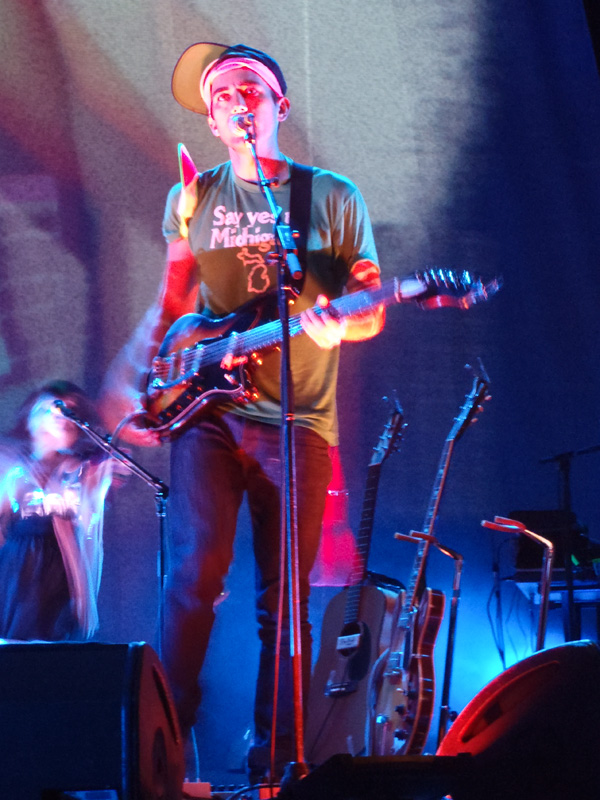
Sufjan and his 11-member backing troupe drifted onto the stage, and Stevens stepped up to the microphone and announced, “My name is Sufjan Stevens, and I’m your entertainment for the evening.” And entertaining he would be.
Given the prior setlists, we waited for what we believed would be the finespun Seven Swans. So we were somewhat surprised when, instead of the softer, banjo-inflected Seven Swans, we heard the trombones, flute-effects, drum and bass kick in heavy, and the high group vocals lift, all of which heralded the title track from his brand new record, “The Age of Adz” (pronounced “Odds”). With its refrain, “Eternal living!” the vocals soared and the horns provided powerful fanfare, and the new Sufjan stepped out boldly. To begin the show with Age of Adz instead of a “transition song” from the days of yore turned out to be a perfectly fitting move, which paid huge dividends this night, and set the stage for a performance focused primarily on his copiously-complex and yet beautifully-melodied new compositions. The ten-minute Age of Adz immediately gave great contrast between the new and old Sufjan. Though the beautiful bombast begins the song, it segues from that “Revelations Soundtrack” to the sweet silences and sequences of “Gloria, Gloria, Victoria, Victoria” and “when I live, when I live, I’ll give it all I’ve got” before finishing with the heralding-choir effects. The song provides a stunning and fitting ebb and flow from the new to the old and back again that broadcasts a new era for Stevens. And we couldn’t be happier.
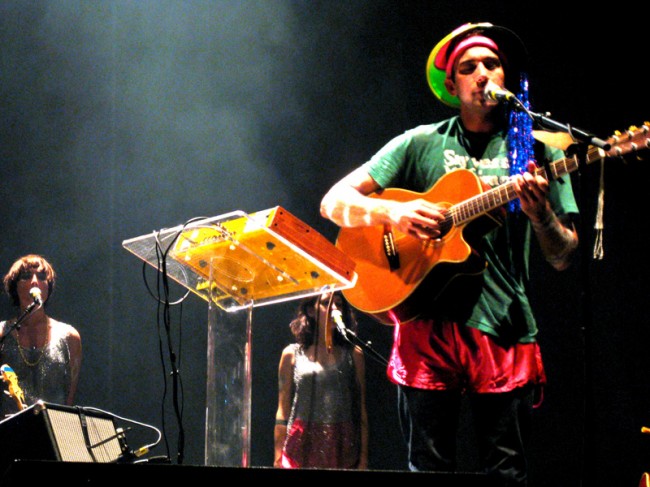
Throughout the two-hour, 13-song show the stage was bathed in audacious Adz-oriented lighting with a screen filled with Adz-animation and graphics, and the 11-member group. The two drummers were the perfect contrast and counterpoint, with the quickened top-end dominated on the right side and the bottom handled with aplomb on the left. To our ears the two trombonists added supremely to the evening, conveying both phantasmic fanfare and warmth, and filling the interstices perfectly. And, of course, Sufjan contributed mightily with his “little voice” (as he dubbed it), guitar and synth-board contributions. Stevens sells his vocals short since we were impressed by his ability to hit all the notes and then some throughout, and by his ability to convey both the epic and the perfectly private. And the female singers’ vocals and dancing were paired perfectly to the proceedings, not to mention DM Stith’s piano-playing acumen. The troupe bounced and pantomimed around the stage all evening, providing stellar sonorous and visual accompaniment. And the group’s clarion call was provided by the best sound we have ever heard live, with clarity and deft dynamics. Clarity, clarity!! The audience sat in reverence throughout, and we even noticed a few tears shed during the opening song. Stevens evokes his audience’s emotions well.
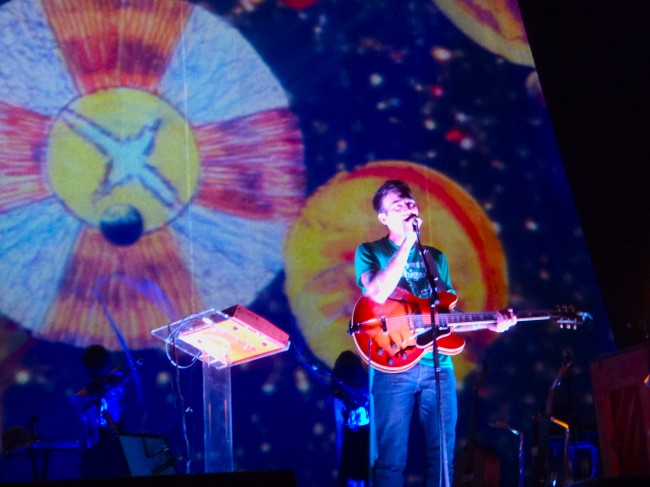
The setlist (see below) naturally focused on the new record, moving next to the comparatively-pop (but still seven-minute-long) “Too Much” with its refrain that “there’s too much riding on this,” wherein we sense the performer’s anxiety in having to meet the world’s high expectations. He then quieted down with the throwback, Heirloom (appropriately titled) off of his recent “All Delighted Peoples” EP. It was a quieter moment that hearkened back to his banjo-and-hush days (sans banjo, which sat unused on the stage the entire evening). Next up was one of our favorite moments of the show, the moving, powerful Vesuvius, with its “chorus” of “Sufjan, follow the path, follow your heart,” which helps to answer his audience’s question as to why he’s not still composing and performing the simpler, quieter songs of yore. He simply has to progress, like all of us. We love the flute/recorder sounds on Vesuvius that echo the Peruvian instruments in Paul Simon’s El Condor Pasa (a further example of Stevens’ recent homages to Simon heard more on “All Delighted Peoples”). And then it was back to the acoustic with the delicate “heirloom” of Futile Devices, a delightfully simple love ballad found on the new album, including its touching opening line: “It’s been a long time since I memorized your face.” Throughout the concert we sensed that the song sequencing was meant to help explain his sudden musical shift and new mode. Mission accomplished.
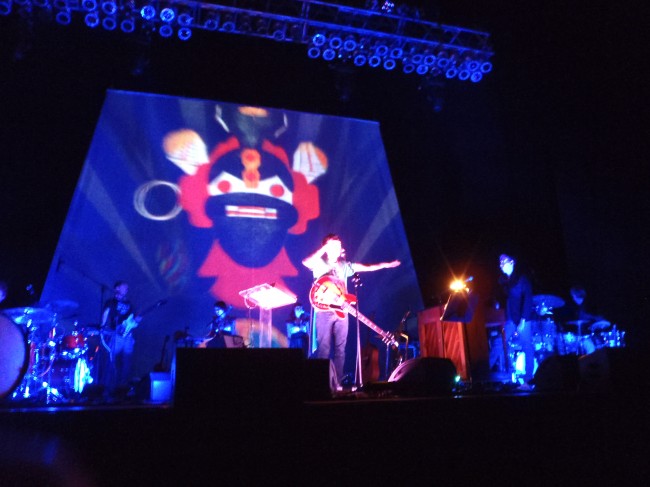
Up next was another of our favorites off the new record, Get Real, Get Right, with its refrain “Get real, get right with the Lord,” followed by Now That I’m Older, with its poignant lyrics and angelic voices (done to perfection by the two female singers). The powerful I Walked followed, in which we hear a lover’s excuses, justifications, and gracelessness, and the demise of a relationship. Despite the lyrical heaviness, I Walked is a powerful pop song, and was done to perfection this evening. He then moved to the quieter, haunting Enchanting Ghost, off of “All Delighted Peoples.”
Nothing that came before could prepare us for what followed: all 25-minutes of Impossible Soul, which he described after as his “magnum opus.” We had anticipated Stevens might redact the less melodious, more experimental portions of Impossible Soul for concert settings, but as the song says: “Seems [we] got it wrong.” Though the three to four melodic themes were well represented throughout the song, the ensemble stretched out into even more experimental and challenging modes (including Stevens’ outlandish auto-tune vocal interludes). And dancing prevailed on the stage. Late in the song the audience finally rose to dance along with the troupe, and we sensed that the throng was finally “getting it,” and thereafter was much more responsive. Following the song’s end, Sufjan commented that Impossible Song is “The love song of all love songs.” An audience member humorously requested that they “play it again!”
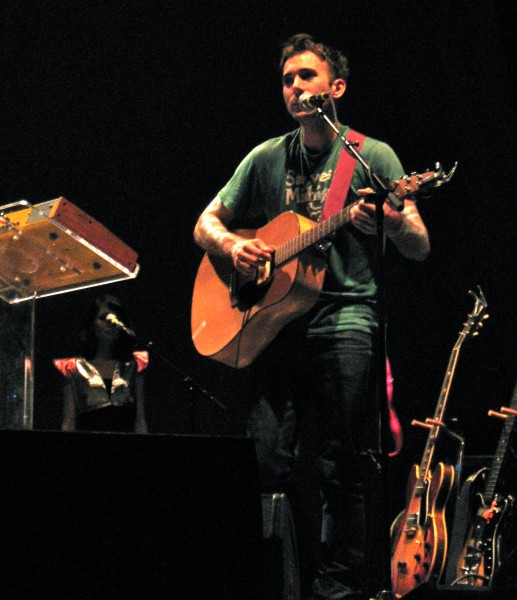
Instead, Sufjan chose to end the set with his great song, Chicago, off of “Illinoise.” The crowd was now in full movement and bellowing the “All things go” chorus throughout. ‘Twas a great end to the set.
For the encore, we were treated to Sufjan alone on piano singing Concerning the UFO Sighting. UFO was captivating with its “revenants” and “three stars,” though it felt a bit perfunctory. Again we sensed Stevens’ temporary (hopefully) loss of allure for his old songs. And unlike in many other recent shows, there would be no Casimir Pulaski or John Wayne Gacy, Jr. this night. Stevens instead surprisingly broke out a 15-minute rendering of All Delighted People to close the encore. We were initially disappointed to not hear some more of our favorites from the past, but the breadth, depth and complexity of ADP won us over completely. We love the repeated use of Paul Simon lyrical elements (“And the people bowed and prayed to the neon god they made,” and “In restless dreams I walked alone”). Like Impossible Soul, ADP was, in a word, epic.
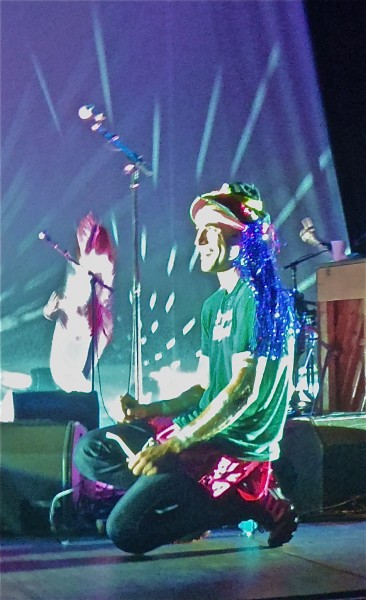
As much as we liked Stevens’ banjo-and-hush era, we completely embrace the current, more-complex, ensemble-rave era, and look forward to future Sufjan maneuvers.
Our only concern at all is the philosophical bent of this record and what is to come. Sufjan spent a long interlude explaining the “prophet” protagonist behind the new record, Prophet Royal Robertson. To our ears, we’re not sure this Prophet is worthy of emulation or expounding, but we’ll defer to Stevens, knowing that to date he’s managed to sing the right songs at the right time. Time will tell as to his next steps. But we trust we’ll be there with him to enjoy the ride.
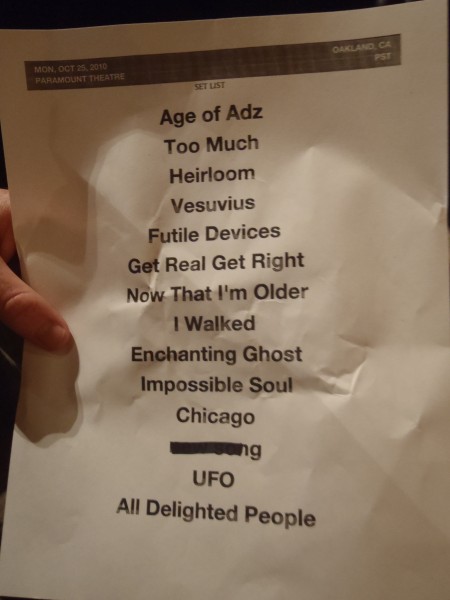
For those playing along at home, please consider skipping the next stage of our trip: we were asleep by midnight and on the road by 4am to make it back to Santa Barbara at 9am. Tuesday was Shatterday.
For a great additional report including the Tuesday night show at the Paramount, check out the post over at Birth is Just a Chorus. The supplemental reading at the bottom of that post is commendable.



Yup, I agree. The more I listen, the more I like them! That said, I’m going back to listen to the old stuff again too!
Andy,
ADP and Age of Adz are growing on me with each listen, and am getting to the point where I love the new songs MORE than the old songs. There’s so much more depth and complexity in these songs. Repeated listens reap larger benefits.
Amen, what an epic show!
Nice recap too, thanks!
Great write up! Boy, you sure saw a different show. He played banjo on a few songs for us, which was nice. Like you, I embrace the new stuff and feel it is the right thing, right now. However, hearing a few of the old ones made me wish I had also seen him 5 years ago. Such is life.
[…] we haven’t gushed enough about Sufjan Stevens’ record “Age of Adz” and his worldwide tour, check out the links below to stellar HD videos of Stevens and crew performing the songs All […]
[…] traveled to Oakland to see Sufjan for the first time and were not disappointed (sure, we would have liked a couple more of the banjo-and-hush era songs, […]
[…] missed it, and to check out the magnitude and pageantry of his current tour as seen by us at the Paramount Theatre last month, check below. Stevens and his merry marauders gave a national audience a […]